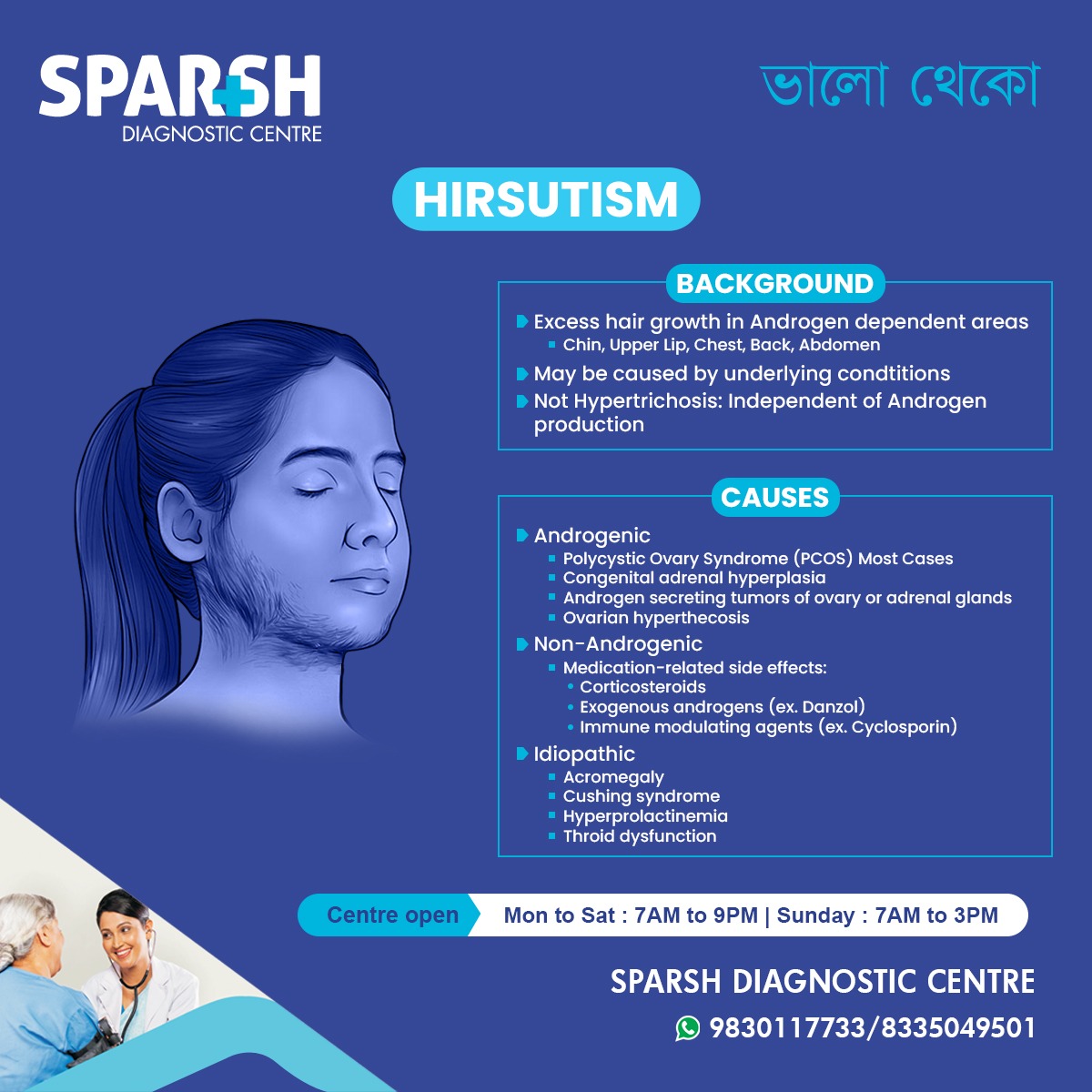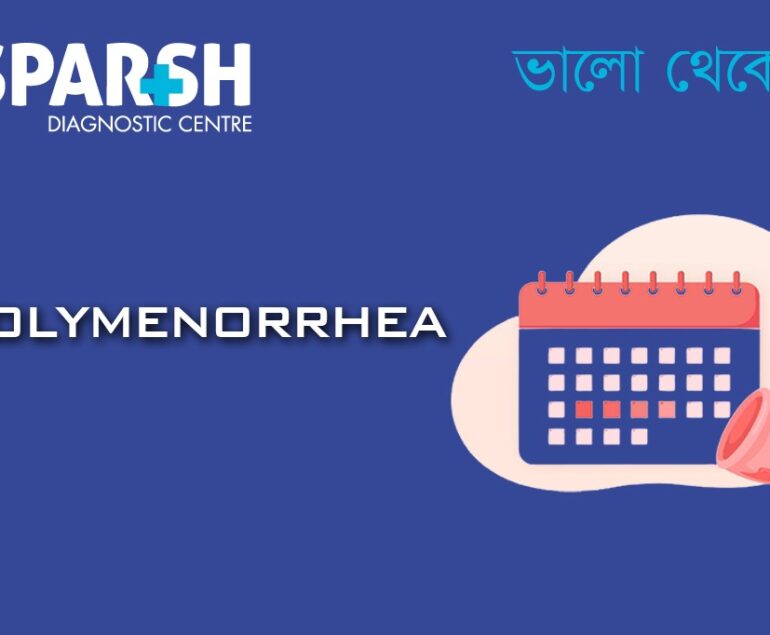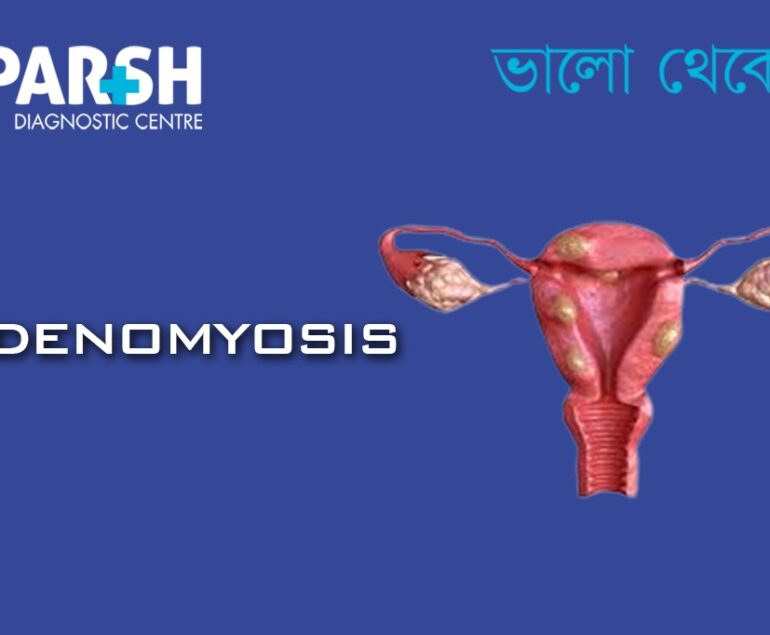Hirsutism is a condition where women develop excessive, coarse, and dark hair growth in areas where men typically grow hair — such as the chin, upper lip, chest, back, or abdomen. It is most often linked to androgen (male hormone) excess or increased sensitivity of hair follicles to these hormones.
Unlike hypertrichosis, which refers to generalized hair growth regardless of hormones, hirsutism is androgen-dependent.
Difference Between Hirsutism and Hypertrichosis
Hirsutism: Hormonal or androgen-related excessive hair in male-pattern areas in women.
Hypertrichosis: Hair growth that is not related to androgens and can occur anywhere on the body.
Causes of Hirsutism
Hirsutism can be androgenic (related to hormone imbalance) or non-androgenic (caused by medications or other factors).
1. Androgenic Causes
These are conditions where the body produces too much androgen or where hair follicles are overly sensitive:
Polycystic Ovary Syndrome (PCOS): The most common cause of hirsutism, often accompanied by irregular periods, acne, and weight gain.
Congenital Adrenal Hyperplasia: A genetic disorder causing excess androgen production from the adrenal glands.
Androgen-Secreting Tumors: Rare tumors in the ovaries or adrenal glands producing high levels of male hormones.
Ovarian Hyperthecosis: Overgrowth of hormone-producing cells in the ovaries.
2. Non-Androgenic Causes
These are unrelated to natural hormone overproduction:
Medication Side Effects:
Exogenous androgens (e.g., danazol)
Immune-modulating agents (e.g., cyclosporin)
3. Idiopathic Hirsutism
In some women, there is no detectable hormonal abnormality. Possible factors:

Risk Factors
You may be at higher risk of developing hirsutism if you:
Have a family history of PCOS or hirsutism
Have certain hormonal disorders
Take long-term corticosteroid medication
Symptoms of Hirsutism
Dark, coarse hair growth in male-pattern areas
Deepening of the voice (in severe cases)
Irregular menstrual cycles
Hair thinning on the scalp (male-pattern baldness)
Diagnosis of Hirsutism
Accurate diagnosis is essential to identify the underlying cause and plan treatment. At Sparsh Diagnostic Centre, Kolkata, our specialists follow a thorough diagnostic approach:
1. Medical History and Physical Examination
Assess hair growth patterns
Check for menstrual irregularities
Review medication history
2. Laboratory Tests
Hormonal Tests:
Serum testosterone
DHEAS (Dehydroepiandrosterone sulfate)
Blood sugar and insulin levels (to detect insulin resistance in PCOS)
3. Imaging
Pelvic ultrasound — to check for ovarian cysts (linked to PCOS)
CT scan or MRI — to identify adrenal or ovarian tumors if suspected
Treatment for Hirsutism
The right treatment depends on the underlying cause. Our endocrinologists and gynecologists at Sparsh Diagnostic Centre use a personalized approach.
1. Treating the Underlying Cause
PCOS Management: Weight loss, hormonal contraceptives, and anti-androgen medications.
Adrenal or Ovarian Tumors: Surgical removal.
Hormonal Imbalances: Medications to normalize hormone levels.
2. Medications for Hair Reduction
Oral contraceptives (reduce androgen production)
Anti-androgens like spironolactone (block androgen effects on hair follicles)
Topical eflornithine cream (slows facial hair growth)
3. Cosmetic Hair Removal
Laser hair removal — long-term solution
Electrolysis — permanent hair removal option
Waxing, shaving, and depilatory creams — temporary methods
4. Lifestyle Changes
Weight management (reduces androgen levels in PCOS)
Complications of Untreated Hirsutism
If left untreated, hirsutism can:
Worsen over time
Affect emotional well-being and self-confidence
Lead to complications of underlying hormonal disorders (e.g., infertility in PCOS)
Prevention and Self-Care Tips
While not all cases can be prevented, you can reduce risk or manage symptoms with:
Maintaining a healthy weight
Avoiding unnecessary use of androgen-containing medications
Seeking early treatment for hormonal imbalances
When to See a Doctor
Seek medical advice if you:
Notice sudden or rapid hair growth
Have other symptoms like deep voice, muscle growth, or menstrual changes
Experience emotional distress due to unwanted hair
Why Choose Sparsh Diagnostic Centre for Hirsutism Diagnosis in Kolkata?
Comprehensive hormonal testing under one roof
Advanced ultrasound imaging for accurate diagnosis
Expert endocrinologists and gynecologists for personalized treatment
Patient-friendly care focused on privacy and comfort
Hirsutism can be distressing, but with proper diagnosis and a targeted treatment plan, it can be effectively managed. At Sparsh Diagnostic Centre, Kolkata, we offer advanced diagnostics and compassionate care to help you regain confidence and improve your quality of life.
📞 Call us today at 9830117733 / 8335049501 to book your appointment.
#BhaloTheko
Disclaimer:
No content on this site, regardless of date, should ever be used as a substitute for direct medical advice from your doctor or other qualified clinician.

![]()






[…] also cause symptoms like acne, hirsutism (excess facial/body hair), and scalp hair […]
[…] Irregular periods, acne, hirsutism, infertility, weight […]
[…] This excess of male hormones is responsible for many of the physical symptoms of PCOS, such as excessive hair growth (hirsutism), acne, and thinning hair. Alongside these, women with PCOS frequently experience insulin […]
[…] Acne and excessive hair growth (hirsutism) […]
[…] and excess hair growth (especially with […]
[…] or hirsutism (in […]
[…] Excess facial or body hair (hirsutism) […]